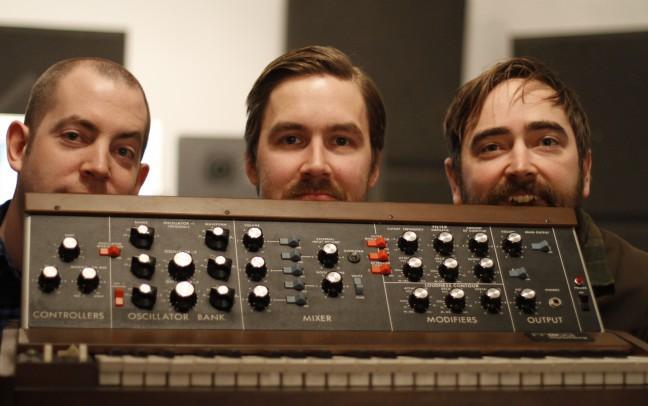The band Icarus Himself knows opposites attract – musically
at least. The Madison based trio juxtapose saccharine vocals with barks of
emotions, death with love and ambient effects with roaring instrumentals. In
fact, Icarus Himself thrives by marrying these seemingly contradictory elements
to create their signature sound. And listeners love it.
Baritone guitarist Karl Christenson describes the group’s
music as cavernous, electro, folk-rock. Imagine reverb ricocheting off a wall, while
ethereal synth effects and deconstructed lyrics float amid the
well-orchestrated cacophony.
“I think there’s psychedelic elements to some of the
[songs,] but maybe it’s just the reverb that everything’s drenched in, ”
Christenson said.
Guitarist and vocalist Nick Whetro qualifies the tricky task
of assigning their music to a specific genre.
“I think if you tend to use a lot of reverb in your music
people tend to lump you in with the psychedelic genre,” Whetro said.
The trio unofficially dubbed their sound Wisconsin Wave to
poke fun at the sub-genres of indie music. If music about cadaver love and
morbidly obese babysitters defines Wisconsin Wave, Icarus will continue to
reign supreme.
Icarus Himself creates its carnivalesque sound with virtuoso
piano samples, omnichord lines, phasers, a slap action delay on the lead mike
in concert and ample experimentation. The group draws inspiration from the
synthesizer work of Brian Eno, the percussion flavor of the Walkmen, Spoon and
the Beatles and the baritone guitar that dominates the soundtracks of antique
spaghetti Westerns.
The group welcomes unconventional song structure. Often
instead of telling a story, Whetro tries to capture a sound. Whetro cites “Digging
Holes” as an example of the technique. The repetitive vocals layer with the
other instrumentals to create the auditory illusion of space.
Icarus Himself began recording a new album Friday, Feb. 25, and they hope to release the record in late summer or early fall. On it, samples
will no longer serve as the basis of each song. The group plans to create a
more natural sounding album, but for the human force behind Icarus Himself,
natural might be a relative term. It focuses on Whetro’s experience growing up
and working as a factory worker in Indiana before he moved to Madison and found
love.
“It’s a whole Shakespearean thing, but no one stabs me in
the back,” Whetro said.
“We gotta record all day today man. We’ll see what happens,”
Kolberg laughs.
“Watch yourself,” Christenson adds.
The emotions Icarus Himself conveys on their albums and
during a live show differ at times, though listeners will find both rewarding.
“Someone came up to me at a show one time. She had one of
our CDs, and she said we’re a lot more depressing and darker live,” Whetro
said. “And, I was just like, ‘That’s what we’re going for.'”
Live, Icarus Himself tries to generate tension for
audiences.
“[It’s] the anticipation that something big is happening in
the song,” Kolberg said. “I hope that some of our songs come across that way to
other people.”
Before Icarus Himself, Whetro and Christenson played in the local
band National Beekeepers Society. In 2007, Whetro created Icarus Himself as a
solo project when he began to write songs that featured folk elements. This
marked a departure from the garage, slacker-rock style of the Beekeepers. Whetro
later recruited Christenson, and Icarus Himself gained momentum.
Whetro and Christenson recorded beats and other
instrumentals to realize their recording project live before drummer Brad Kolberg
joined the band. Sampling now serves as their fourth member. During a show,
Icarus Himself samples keyboard and synth lines to recreate the complexity of
their records.
“We started backwards with tons of samples and layers,”
Whetro said. “Now we’re doing straight up band in the studio. We’ll add
synthesizes and noises and drum machines on top of that.”
Whetro explained that “Cadaver Love Song” off their 2010 EP Mexico serves as a “microcosm for the history of our band.”
“That’s a good example of how the band has changed,”
Christenson agreed. “It starts with just samples and beats of just the two of
us and ends up with Brad.”
Kolberg joined Icarus Himself in 2009 after Whetro and
Christenson began recording Mexico.
“I feel like now that I’m in the band, songs since then have
been written as a three piece,” Krongberg said.
Creating music is a deeply personal experience for the members
of Icarus Himself. Even the morbidly, sweet lyrics to “Cadaver Love Song” were
inspired by the experiences of Whetro’s wife in her first year of medical
school.
Lately, audiences have been connecting with the lyrics to
“Seen it Coming…Mexico,” a song off their EP that references escape and love.
“People sing along with the quiet part,” Whetro said. “We’ve
had times where we’ve played it, and I get too excited. I end up picking my
guitar too hard. […] I bust my finger open and it bleeds.”
Icarus Himself continues to earn acclaim. They recorded a
Daytrotter session, and the website named “Digging Holes” one of the “Best
Songs of 2010.” Daytrotter is a website with a studio in Rock Island, Ill. that helped to introduce readers to groups like The National, Iron and Wine and
Vampire Weekend by posting live recording sessions.
“All my favorite bands have done Daytrotter, and the fact
that we got to do it too was huge for me, an honor,” Kolberg said.
“The key to it is they’re discerning,” Christenson said.
“They’ve built up a trust with their readership.”
Icarus Himself continues to experiment as they connect with
audiences. Before this interview, Kolberg suggested dampening the ring of the
drums by draping a sheet over the set.
A willingness to innovate characterizes a true artist.
Icarus Himself plays a free show at Mickey’s Tavern Friday, March 4 with Secondary Modern at 10:30 p.m.


